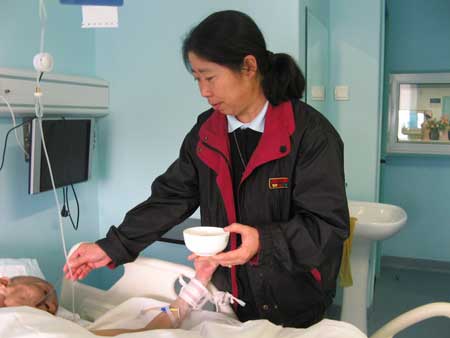Catholics & Communists cooperate to fight AIDS
From March to August, a team of three nuns, part-time doctors and university students, provided medical aid, spiritual support and more than 10,000 yuan in donations to some 50 AIDS sufferers in the mountainous area of Shanyang, a county-level division of Xi'an, capital of Shaanxi Province.
 |
|
Sister Wang Aixia feeds an AIDS patient at Beijing Ditan Hospital on November 14, 2008. |
Project leader Sister Zong Xuejing, 48, says the nuns must hide their religious identities to avoid misunderstanding from villagers and the county government.
"Many are skeptical about our motives," says Zong, project leader since October 1, 2005.
"Some government employees openly asked me if I was collaborating with foreign anti-China cliques.
"The predominant mindset of grass-roots officials is still conservative in China's poverty-hit regions."
Like 99 percent of NGOs on the Chinese mainland, her organization is somewhat illegal, Zong admits. Her NGO registration application has been repeatedly rejected by the Xi'an Civil Affairs Bureau.
"The bureau returned my materials and said nothing. Are we dangerous?"
Zong doesn't know.
For a religious organization on the Chinese mainland, the faint aroma of illegality represents far more than a bureaucratic inconvenience.
It's a tremendous burden not being able to have a legal person, complains Qu Jingbin, director of Shengjing Caritas, an organization under the Catholic Social Service Center, Liaoning Provincial Diocese.
"Our staff can't be approved to enjoy welfare insurance. And as we can't offer invoices, enterprises and foundations are unwilling to donate," Qu says.
"It's even impossible to apply for assistance from national or international projects."
With programs in more than 10 provinces, China's most eye-catching grass-roots Catholic campaign against AIDS lives with constant pressure, admits Sister Wang Yidan of the Jinde Charity of Shijiazhuang, capital of Hebei Province.
"The Xingtai government warned us not to meddle in a 2005 scandal where more than 1,000 were infected with HIV by tainted injections and blood transfusions in the hospitals of Shahe, a county-level city in the prefecture-level city of Xingtai, Hebei Province," Wang says.
"Many victims petitioned and filed suits against the hospital but failed."
In the absence of government action, Jinde Charity took the potentially perilous step of secretly gathering the desperate victims and discussing solutions.
Calls to enhance administration of religious social service organizations are inevitably getting louder, says Lei Lihua, deputy director of the Research Center under the State Administration for Religious Affairs.
"Local governments should admit the effect of religious groups in public service such as AIDS prevention," she says. "Learn to guide, not to reject.
"The root problem lies in legislation. There is a lack of rules specifying religious groups' engagement in public service, but things won't change overnight. "
This apparently arcane debate about religious rights and regulations makes it all too easy to overlook the messy horror the Wangs handle on a daily basis.
 0
0 







Go to Forum >>0 Comments